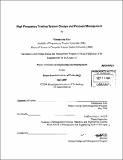High frequency trading system design and process management
Author(s)
Xiao, Xiangguang
DownloadFull printable version (10.22Mb)
Other Contributors
System Design and Management Program.
Advisor
Roy E. Welsch.
Terms of use
Metadata
Show full item recordAbstract
Trading firms nowadays are highly reliant on data mining, computer modeling and software development. Financial analysts perform many similar tasks to those in software and manufacturing industries. However, the finance industry has not yet fully adopted high-standard systems engineering frameworks and process management approaches that have been successful in the software and manufacturing industries. Many of the traditional methodologies for product design, quality control, systematic innovation, and continuous improvement found in engineering disciplines can be applied to the finance field. This thesis shows how the knowledge acquired from engineering disciplines can improve the design and processes management of high frequency trading systems. High frequency trading systems are computation-based. These systems are automatic or semi-automatic software systems that are inherently complex and require a high degree of design precision. The design of a high frequency trading system links multiple fields, including quantitative finance, system design and software engineering. In the finance industry, where mathematical theories and trading models are relatively well researched, the ability to implement these designs in real trading practices is one of the key elements of an investment firm's competitiveness. The capability of converting investment ideas into high performance trading systems effectively and efficiently can give an investment firm a huge competitive advantage. (cont.) This thesis provides a detailed study composed of high frequency trading system design, system modeling and principles, and processes management for system development. Particular emphasis is given to backtesting and optimization, which are considered the most important parts in building a trading system. This research builds system engineering models that guide the development process. It also uses experimental trading systems to verify and validate principles addressed in this thesis. Finally, this thesis concludes that systems engineering principles and frameworks can be the key to success for implementing high frequency trading or quantitative investment systems.
Description
Thesis (S.M.)--Massachusetts Institute of Technology, System Design and Management Program, 2009. Cataloged from PDF version of thesis. Includes bibliographical references (p. 78-79).
Date issued
2009Department
System Design and Management Program.Publisher
Massachusetts Institute of Technology
Keywords
System Design and Management Program.